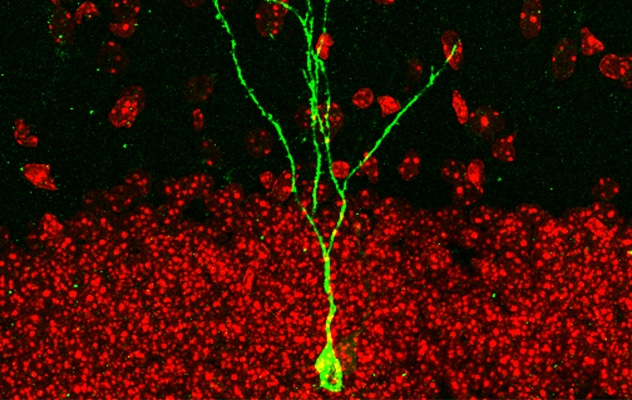July 21, 2021
Mayo Clinic researchers have identified a possible therapeutic strategy to prevent chemotherapy-induced cognitive impairment (CICI), also known as chemo brain. In a laboratory study, mouse models that received nicotinamide mononucleotide (NMN) before cisplatin treatment avoided the cognitive deficits observed in mice that didn't get the NMN before chemotherapy.
"We found that NMN had a preventive effect on CICI, while having no detrimental impact on tumor growth or on cisplatin's anti-tumor activity. This indicates that NMN may be a safe and promising compound for CICI," says Mi Hyeon (Mi-Hyeon) Jang, Ph.D., director of the Neurogenesis and Brain Repair Laboratory at Mayo Clinic in Rochester, Minnesota.
CICI involves subtle to moderate impairments in several cognitive domains, including working memory, processing speed and executive functioning. The condition has been reported in up to 75% of people treated with chemotherapy, with a significant subset experiencing persistent cognitive decline. Meaningful treatments aren't available, as the underlying CICI pathology hasn't been fully understood.
The Mayo Clinic study, to be published in Cancer Research, pinpointed disruption in metabolic pathways involving nicotinamide adenine dinucleotide (NAD+) as significant contributors to CICI. NAD+ is a metabolic important in cell division and survival.
Declines in cellular NAD+ levels and its rate-limiting enzyme, nicotinamide phosphoribosyltransferase (known as NAMPT), play a pathogenic role in age-related disease. NAD+ and its precursor, NMN, have both been reported as promising therapies to delay aging, increase life span and improve cognition.
"There are many similarities between age-related cognitive dysfunction and chemo brain," says Wendy J. Sherman, M.D., a neuro-oncologist at Mayo Clinic in Jacksonville, Florida. "Patients treated with chemotherapy might experience memory blocks or trouble multitasking, or constantly lose their places when reading so they have to go back and reread sentences. Some patients use words like 'stupid' to describe themselves because they can't remember what people told them. When these effects persist, they stand in the way of people returning to normal life after cancer treatment. It's imperative that we find a way to address chemo brain."
NMN's therapeutic effects
Because CICI is commonly reported among women with breast cancer, the Mayo Clinic experiments used female mouse models of breast and ovarian cancers. The mice were given cisplatin; in addition, some were pre-treated with NMN. In subsequent learning and memory tests, the mice pre-treated with NMN outperformed mice that weren't pre-treated.
تخلق النسيج العصبي الحُصيني عند البالغين

تخلق النسيج العصبي الحُصيني عند البالغين
تظهر الصورة بصبغة الفلورسنت بروتين فلوري أخضر- خلايا عصبية حديثة معدلة وراثيًا (أخضر). ويضعف السيسبلاتين العملية المستمرة لتخلق النسيج العصبي الحُصيني عند البالغين، مما يؤدي إلى قصور في القدرة على التعلم والذاكرة.
The researchers then analyzed the effects of cisplatin and NMN on hippocampal neurogenesis in mice. The results showed reductions in neural stem cells and a proliferative marker, which are key for initiating neurogenesis, in cisplatin-treated mice. The reductions were significantly restored by NMN administration. Further analysis of adult-born neurons found that cisplatin reduced dendritic length and branch numbers, but NMN fully reversed those deficits.
"Taken together, these findings suggest a therapeutic effect of NMN in cisplatin-induced impairments in neural progenitor cell proliferation, neuronal morphogenesis and memory function in mice," says Ki Hyun Yoo, Ph.D., a researcher in the Neurogenesis and Brain Repair Laboratory.
To further assess the effects of cisplatin and NMN in human neurons, the researchers generated cortical human neurons from human-induced pluripotent stem cells. The neurons exposed to cisplatin in vitro displayed significant abnormal phenotypes, which were improved by doses of NMN.
To determine whether NMN affects tumor growth or cisplatin's efficacy, the scientists collaborated with two tumor-biology researchers at Mayo Clinic's campus in Minnesota: John R. Hawse, IV, Ph.D., and Saravut (John) J. Weroha, M.D., Ph.D., a medical oncologist. Those investigations determined that NMN neither promotes tumor growth nor interrupts the anti-tumor activity of cisplatin, ensuring NMN safety at the effective dose utilized for behavioral memory tests.
The researchers note that additional studies are needed to determine whether NMN has similar neuroprotective effects in male mice. In addition, since cisplatin isn't the only chemotherapy associated with cognitive dysfunction, future studies might address whether the neurotoxic effects of other chemotherapies are mediated through dysregulated NAD+ metabolism.
CICI, which only recently has been recognized as a complication of cancer treatment, is likely to become an increasing concern.
"We now have some very effective cancer treatments, and it's wonderful to have patients who are able to beat their disease. But if the treatment affects cognition, patients feel like they are no longer the same person," Dr. Sherman says. "That can lead to depression and can affect a person's relationships and ability to return to work."
Mayo Clinic is committed to a multidisciplinary approach that addresses all aspects of patient care, as well as translational research that ultimately improves that care. "Increasing NAD+ through NMN supplementation offers a potential strategy to safely prevent CICI and improve quality of life for cancer survivors," Dr. Jang says.
This work was supported by the National Cancer Institute, Mayo Clinic Breast Cancer SPORE and Regenerative Medicine Minnesota.
For more information
Neurogenesis and Brain Repair Laboratory. Mayo Clinic.
Yoo KH, et al. Nicotinamide mononucleotide prevents cisplatin-induced cognitive impairments. Cancer Research. In press.